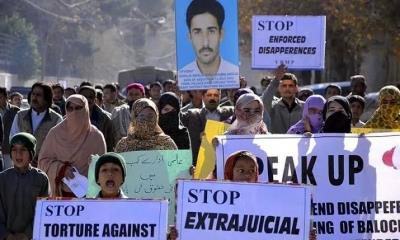(MENAFN- IANS)

By Rahul Kumar
New Delhi, June 1: Reality bites. Sometimes it bites harder when you pen it down as a memoir.
Former Pakistani President General Pervez Musharraf had in an honest admission in his autobiography, In the Line of Fire, written that 'enforced disappearances' was an undeclared policy of the State. That admission is now coming back to bite him.
This Sunday, the Islamabad High Court (IHC) asked the Shehbaz Sharif government to explain how disappearances 'became state policy'. IHC Chief Justice Athar Minallah also asked the government to serve notice on Gen Pervez Musharraf, former Prime Minister Imran Khan, current Prime Minister Shehbaz Sharif and all other heads over the government's undeclared tacit policy of enforced disappearances.
Sharif had promised to the Baloch people recently that he will look into the practice of enforced disappearances by speaking with the 'highest quarters'.
It is certain that Gen. Musharraf is not coming back to Pakistan in a hurry--where he also faces the death sentence for being found guilty of high treason after he suspended the constitution and imposed emergency. At that time in November 2007, he was holding the two powerful offices--the President and the Chief of the Army Staff simultaneously.
Pakistan is not known for respecting the human rights of its many minorities or ethnic groups. The world too is only mildly aware of its brutal Death Squads, nurtured by the Pakistani intelligence and a corrupt military. However, the State-sponsored kidnappings, better known as enforced disappearances, have been noted globally even if the world turned a blind eye to the kidnappings.
On 26-05-2020 A brave Baloch lady Malik Naaz resisted against the Pakistani army backed death squad. She embraced martyrdom and rest in Baloch History. Malik Naaz will be remember by all of Baloch nation for her bravery and resistance for her dignity.
Following the IHC order, the government has constituted a seven-member committee to deliberate upon the unwritten policy of enforced disappearances.
But Pakistan-watchers and activists remain sceptical.
Geopolitical analyst Mark Kinra told India Narrative: 'I don't think investigations by this committee would yield any results until there is strong backing from the Pakistan Army. If the government is serious about ending enforced disappearances, it has to remove the Frontier Corps from Balochistan. Moreover, there needs to be reconciliation with Baloch freedom fighters'.
Why there is scepticism over the committee is because under Imran Khan, Human Rights Minister Shireen Mazari did try sincerely to table the bill of enforced disappearances, but Mazari stated that she was threatened by Pakistan Army for doing so. After passage of the bill from the Pakistani parliament's lower house, the enforced disappearances bill went missing from the upper house.
Kinra says: 'To add salt to the wounds of the families of missing persons, the bill had a clause that criminal charges would be brought against people who are deemed to have made 'false allegations', with a penalty of up to five years imprisonment and a fine of 100,000 Pakistani rupees'.
(The content is being carried under an arrangement with indianarrative.com)
--indianarrative
MENAFN01062022000231011071ID1104304010
Legal Disclaimer:
MENAFN provides the information “as is” without warranty of any kind. We do not accept any responsibility or liability for the accuracy, content, images, videos, licenses, completeness, legality, or reliability of the information contained in this article. If you have any complaints or copyright issues related to this article, kindly contact the provider above.